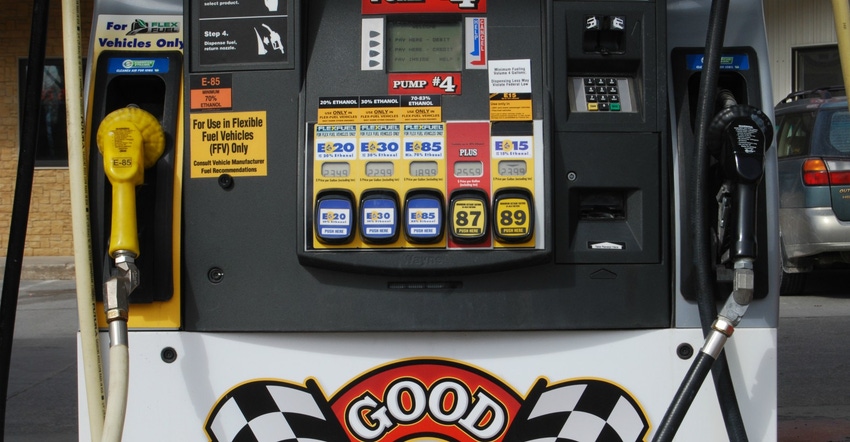December 24, 2019

With reaction ranging from anger to deep disappointment, Iowa farmers, renewable fuel producers and political leaders are frustrated that President Donald Trump failed to keep his promise to restore ethanol and biodiesel demand lost due to waivers granted to oil refiners.
A final rule issued by the U.S. Environmental Protection Agency on Dec. 19 setting renewable volume obligations for ethanol for 2020 and biodiesel for 2021 hurts farmers struggling with low corn and soybean prices. EPA sets the RVOs each year, determining how much ethanol and biodiesel should be blended into the nation’s fuel supply. EPA is obligated to do this by a federal mandate, the Renewable Fuel Standard (RFS). However, waivers granted by EPA to oil refineries have reduced how much biofuel is blended.
Fails to restore RFS certainty
To restore demand for ethanol and biodiesel when waivers are issued, biofuel supporters have repeatedly asked EPA to use a three-year rolling average of the actual number of gallons waived for oil refineries. Iowa officials, including Republican Sens. Chuck Grassley and Joni Ernst, say that was the deal they reached with Trump when they met with him in September. But EPA in its final rule released in December will use an average of the gallons the U.S. Department of Energy recommends waiving, which has been significantly less than actual gallons waived.
In October, Trump announced he made a deal with Republicans, including Grassley, Ernst and Iowa Gov. Kim Reynolds, to increase renewable fuel demand and follow the volume obligations called for by the RFS.
“Apparently President Trump doesn’t care about his promise to Iowa farmers. He had the opportunity to tell his EPA administrator to stick with the deal that was made Oct. 4,” says Jim Greif, Iowa Corn Growers Association president. “ICGA pushed hard for a positive outcome on this new RFS rule. We didn’t get it, but we didn’t go down without a fight.”
New EPA rule favors big oil
During the comment period on EPA’s proposed rule, ICGA urged farmers to tell EPA and Trump to stick with the higher blending requirements required by the RFS. Over 1,000 farmer comments were sent to EPA and Trump. Additionally, ICGA along with other biofuel support groups worked with the Iowa congressional delegation, and testified at EPA’s public hearing, calling for the integrity of the RFS to be restored. The final push was a meeting at the White House with Trump’s economic adviser, Larry Kudlow, a few days before EPA issued the final rule.
“The White House and EPA got our message. ICGA members are frustrated with this lack of interest by the administration in defending our markets for ethanol and renewable fuels. ICGA will not stop fighting for market access for corn in all forms,” Greif says.
Iowa Soybean Association President Tim Bardole adds, “EPA places the oil industry ahead of soybean farmers. This was a missed opportunity by the Trump administration to bring added certainty to Iowa agriculture.”
Farmers frustrated, angry
Monte Shaw, heading the Iowa Renewable Fuels Association (IRFA), says “EPA has granted RFS waiver exemptions liberally to oil refiners since 2016. In this new RFS rule, the president has turned his back on certainty for farmers. We are being told to trust EPA to uphold the RFS in the future, even though for the past three years EPA has routinely undermined the program. Every farmer and biofuel supporter I’ve talked to is deeply disappointed and angry. I don’t think the White House truly understands the depth of discontent in farm country.”
Given the elevated impact of DOE's waiver recommendations going forward, Shaw and IRFA sent a letter last week to EPA Administrator Andrew Wheeler asking the agency to shed light on its waiver review process. Click here to see IRFA’s full letter to the EPA.
Reynolds says, “EPA’s actions continue to disappoint, and it’s understandable why EPA has lost credibility with the people of Iowa. While we agree on the end goal of blending at least 15 billion gallons of ethanol into the U.S. fuel supply annually, this final rule on the waivers allows the RFS numbers to be too easily disregarded. This is already negatively impacting the lives of Iowans as some ethanol and biodiesel plants are closing, and many are reducing production. Farmers are losing an important market.”
Demand destruction takes toll
Iowa Secretary of Ag Mike Naig issued the following statement in response to EPA’s final rule for the RVOs for 2020 for ethanol and 2021 for biodiesel: “I’m disappointed EPA chose to ignore the concerns voiced by renewable fuel producers, farmers and consumers. The flawed formula used to account for waived gallons creates unnecessary uncertainty in our markets, which is detrimental to so many across rural America. We must continue to work together to hold EPA accountable for ensuring the 15 billion gallons mandated by the RFS are met. We must also continue to invest in infrastructure that builds demand and increases the availability of higher blends of biodiesel and ethanol across the state of Iowa.”
The Iowa Department of Agriculture administers the Iowa Renewable Fuel Infrastructure program, offering cost-share grants to help fuel retailers install blender pumps and tanks to increase the availability of higher blends of ethanol and biodiesel. Naig has requested $3 million in fiscal year 2021 from the Iowa Legislature to continue supporting the program. To date, the program has distributed or obligated over $33 million, with $200 million added in private economic activity. This translates to every dollar invested in Renewable Fuel Infrastructure funding, nearly $6 of private investment has resulted.
You May Also Like




